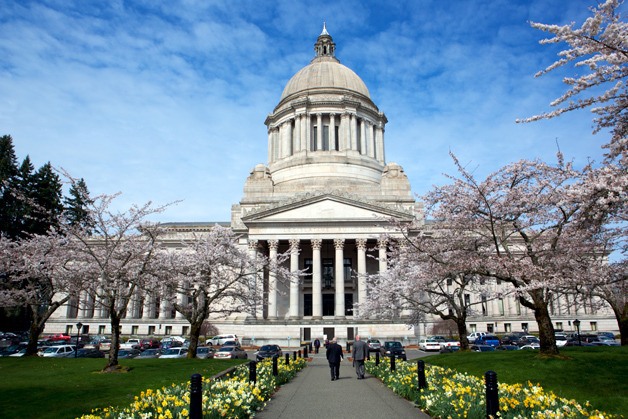OLYMPIA — A key education bill has had an amendment-riddled ride through three Senate committees before earning consideration by the full Senate.
Tuesday the Senate ratified the final draft of SB-6195 on a 26-23 vote, a bipartisan result on both sides of the issue.
The bill would instigate a task force to create recommendations to fully pay teachers for basic education.
Tensions, however, emerged over the details in the bill, including when legislators should take action on local school districts’ special levies.
The bill now heads to the House for consideration.
Senate Democrats involved in creating the original bill and on the Senate Early Learning and K-12 Education Committee maintain that Senate Republicans did not include them in changes to the bill while it went through committee. The bill passed through three committees before placement on the floor calendar.
State Superintendent of Public Instruction Randy Dorn has opposed SB-6195 at each public hearing held by two of committees.
At the latest public hearing for an earlier version of the bill, a superintendent’s representative, Dorn’s Chief of Staff Ken Kanikeberg, said, the bill “continues to defer the state’s obligation to fully fund basic education. The problem confronting the Legislature is not currently a lack of data. It is a lack of political will for the bodies and the governor to work this situation out.”
The court in 2012 declared the state was not fully funding basic education, a constitutional requirement, in what is known as the McCleary order. The court determined last August that the state was in contempt of that order and has since levied a daily $100,000 fine.
The court found teachers are underpaid by the state and that local districts, in order to make up the difference with competitive market salaries, use voter-approved levies to pay for basic education salaries. The court said using levy funds for basic education was unconstitutional because levies are an unreliable funding source.
Many local school districts’ replacement maintenance and operations levies were up for voter consideration in elections held Feb. 9 across the state. The vote-count will be finalized Feb. 19. The 134 districts with M&O ballot measures were asking voters to approve $3.392 billion in special property tax levies to be collected over the next one to four years to benefit more than 411,000 students. Additional school districts plan special levy votes April 12.
When a bipartisan work group of legislators convened to create the original SB-6195 last fall, they discovered they lacked data that separated the state’s support of teacher pay from local district’s additional funds.
The bill passed by the Senate creates a task force to create recommendations for fully compensating teachers by the state. The group would produce recommendations for the next legislative session to meet the court’s mandate. The bill also requires action to address local levy dependency by the end of the 2017 Legislative Session.
An earlier version deferred the date for required levy reform to Dec. 31, 2017.
“The intent of the substitute is to make the task force that stems from this bill … more successful,” Sen. Bruce Dammeier, R-Puyallup, said during the Senate Ways and Means committee deliberation last week.
“Right now we don’t know what money is paying for what and that is an essential issue for the state to live up to its responsibility,” he added.
In the initial hearing and evaluation before the Senate Early Learning and K-12 Committee, a substitute SB-6195 passed 5-4. The measure was further amended by the Senate Ways and Means Committee before earning a 13-10 approval vote.
In the House of Representatives, HB-2366, a twin to the original Senate bill, passed on a 64-34 bipartisan vote Jan. 25, and carried only one amendment, so capital funds would not be used to supplement basic education funding. Its initial Senate hearing before the Early Learning and K-12 Committee is Feb. 18.
“There’s information we need to gain from local school districts to solve the problem,” said Sen. Joe Fain, R-Auburn, during the Senate Early Learning and K-12 executive session. “If this Legislature is incapable of acting and that issue not be resolved, we’ll be in a worse situation in our public schools.”
Sen. Andy Billig, D-Spokane, said the action by the end of the 2017 legislative session is “key” because “it keeps our promises to Washington’s one million school children and has the best chance of getting us out of contempt of court.”
Billig was a member of the work group that created the bill. Sens. Doug Ericksen, Ann Rivers, and Christine Rolfes along with Reps. Pat Sullivan, Kristine Lytton, Chad Magendanz and Adam Smith were also part of the pre-session work group.
“It is great news to see that both the House and Senate have passed legislation with bipartisan support to ensure we continue the necessary next steps towards fully funding our schools,” said Gov. Jay Inslee. “Legislators can get this done, and I remain confident they will send this bill to my desk.”
Senate Majority Leader Mark Schoesler, R-Ritzville, said of addressing McCleary deadlines, “We’re going to get a McCleary bill this year. It’s just a matter of when. Right now, everything is fluid. If this was an easy problem, the governor would have had a plan for us. The important thing is getting it right.”
(Izumi Hansen is a reporter with the WNPA Olympia News Bureau.This story is part of a series of news reports from the Washington State Legislature provided through a reporting internship sponsored by the Washington Newspaper Publishers Association Foundation. Contact Reporter Izumi Hansen at hansenizumi@gmail.com.)


